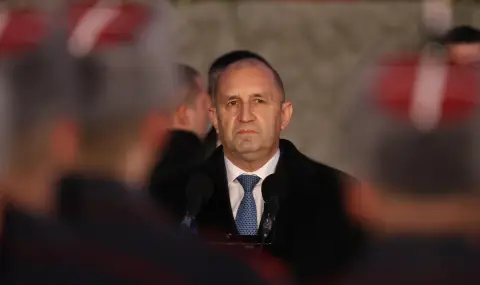Comment by Emilia Milcheva:
Within 24 hours, President Rumen Radev criticized the European rearmament plan and met with an American business delegation he invited, which represented companies from the defense, space and cyber industries and high technologies. His statement that he is in no hurry to join the "fanfare" for rearmament is an attempt to undermine Europe's efforts to become a real security factor, but his actions hint at plans to modernize the army with help from overseas.
Radev expresses skepticism about the European rearmament plan, claiming that the funds will come from loans and redirection of structural funds, which would harm sectors such as water supply, infrastructure and social projects. However, he misses the truth that security is fundamental to economic development. If Europe remains vulnerable and dependent in terms of defense, this would lead to even greater economic risks.
Bulgaria outside the EU defense?
On the one hand, the president is against the European rearmament strategy, but on the other - he insists on the modernization of the Bulgarian army and strengthening the defense industry – not Brussels, but the government to take care of this. That is, Bulgaria should not rely on pan-European initiatives and remain outside the common EU strategy, which would put it in a weak position, but not only it.
Radev calls on the government to be critical of the country's commitments in the context of European defense. In the face of growing threats to the Old Continent, the lack of solidarity and a common defense policy weakens the EU's position as a global player, which is completely in tune with the new wind across the Ocean.
The president's consistent line as a critic of European policies is known, but he does not offer a realistic alternative for dealing with the Russian threat and ensuring the peace he constantly talks about. However, his claims about the enthusiasm in Brussels regarding the 800 billion euros in defense investments, for which he says that “there is no such money”, are exaggerated. But the EU is aware of this uncertainty - it is about 150 billion euros in the form of loans guaranteed by unused funds from the EU budget, and 650 billion euros that member states could provide through flexible fiscal rules.
The challenge is whether all countries will do it, after unanimously supporting the plan presented by European Commission President Ursula von der Leyen.
And it smelled of gunpowder…
Unlike the head of state, Prime Minister Rosen Zhelyazkov confirmed the management position for integration into European defense. This is a good opportunity for Bulgaria's military industry to take advantage of European funds and the national budget to develop ”extensively”. On this point, the government and the presidency differ, but on others they are in sync and unanimous - for example, that the strategic partnership with the US in the field of defense and new technologies must continue.
However, the president was insistent on a specific private investment for a gunpowder plant, which cannot be started for a year - with the argument that Bulgaria must develop its own production of this raw material, a main component in ammunition, providing the greatest income. Currently, Bulgarian arms companies provide gunpowder mainly through imports from Serbia, and nearly 40% of the cartridges and shells that Ukraine uses against the Russian army are produced in Bulgaria.
Radev recalled that for nearly a year he had raised the topic with the “responsible institutions” in connection with the stated investment intention, but remained without reaction. In January this year, in an interview with “Free Europe” Former Defense Minister Boyko Noev revealed that Delyan Peevski, who was sanctioned for corruption by the US and UK and leader of the “DPS - New Beginning”, thwarted the construction of a strategic gunpowder plant near Shumen. At the last moment, the plant did not receive the status of a strategic facility in 2024, although there was a draft decision of the Council of Ministers for it. The project is by the arms dealer and manufacturer Emilian Gebrev, who, according to media reports, also imported gunpowder for Bulgarian arms companies.
Peevski's influence?
What will the current government, which is also susceptible to Peevski's influence, do? During his visit to the "Arsenal" plant in Kazanlak, Prime Minister Zhelyazkov said that it is best "when there is a supply chain that is uninterrupted and its own production of materials". It is not clear whether Gebrev's plant will receive the green light. But with investments and European funding, Bulgaria can modernize its plants ("Arsenal", VMZ Sopot, "Dunarit", etc.) and increase the production of standardized ammunition for NATO, which has been talked about since the Russian aggression in Ukraine began.
In 2023, however, the president did not look across the Ocean, but towards Brussels, when he stated that together with the European Commission, more investments would be made in the Bulgarian military-defense industry. Then the cabinet he appointed refused Bulgaria to join a joint EU order for Ukraine for the supply of 1 million 155-mm artillery shells (NATO standard, b.a.). Just a few days later, however, the “Financial Times” reported that the US had concluded a deal with Bulgarian arms companies for precisely such shells.
The issue of Radev's powers
The constitution grants the head of state certain powers for foreign policy, but not for contracts that the government concludes in the fields of defense, energy, infrastructure, etc. We remember his activism and lobbying of his appointed ministers to choose the Swedish Gripen fighter jets for the Bulgarian Air Force, instead of the American F-16s, which were approved by parliament.
There is no need for the president to make a big fuss about the European rearmament plan. Just don't get in the way.
